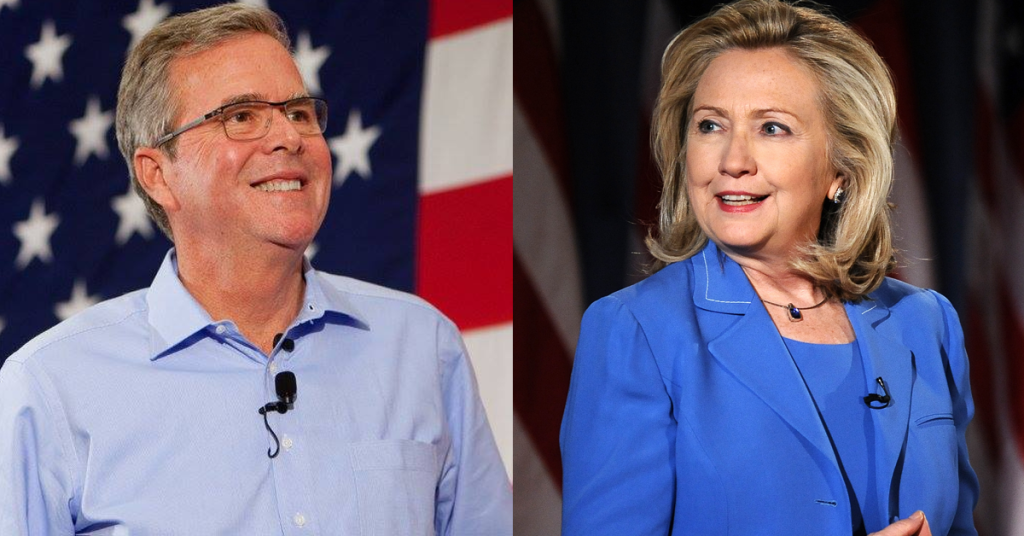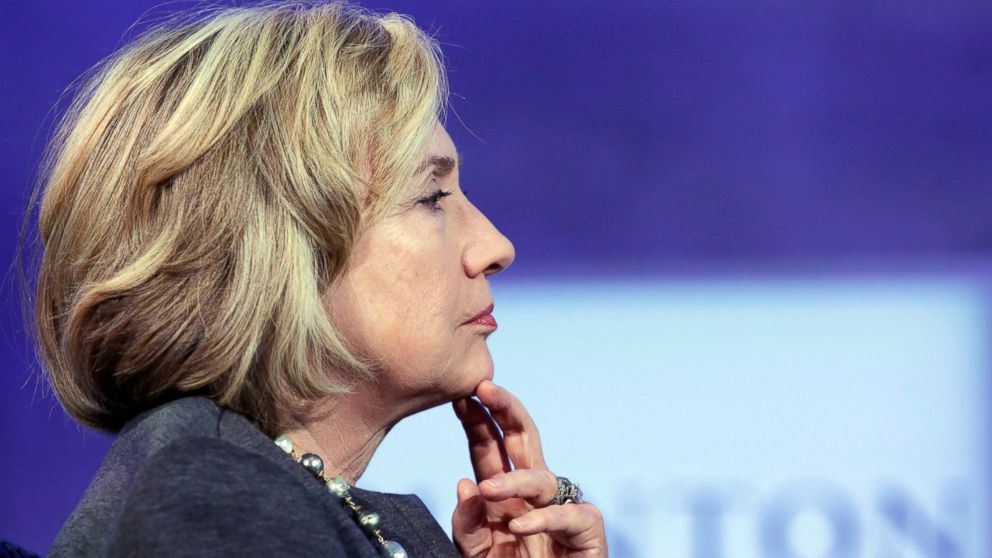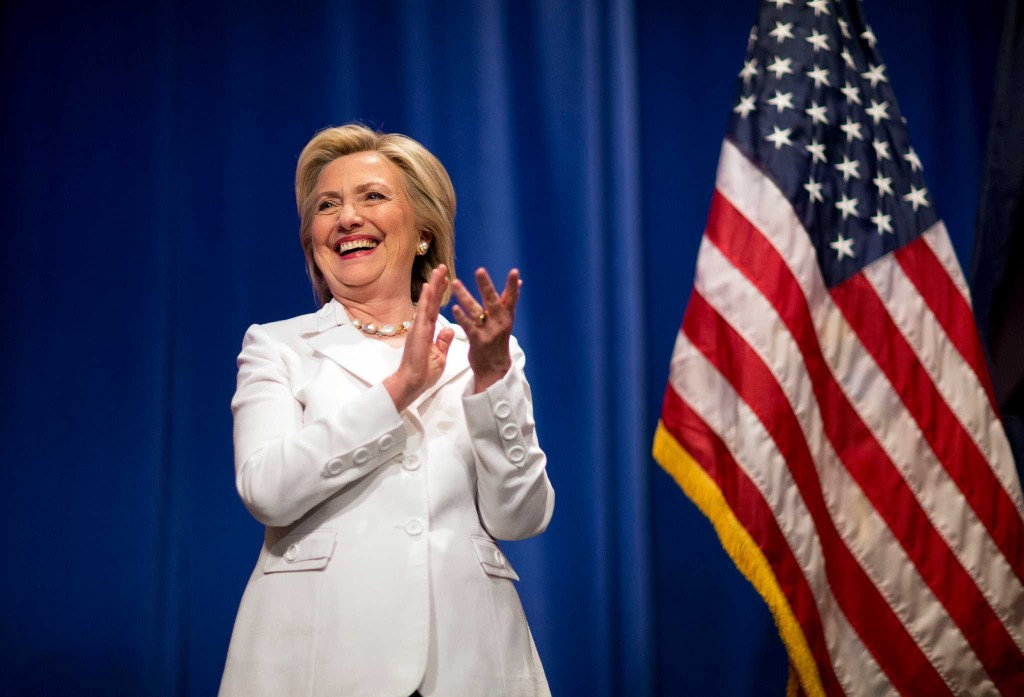Quiet on Keystone, Hillary Clinton faces sharper attacks from rivals

Hillary Rodham Clinton dodged questions Tuesday about her positions on trade and the Keystone XL pipeline, telling a New Hampshire voter that if the future of the project opposed by environmentalists remains “undecided when I become president, I will answer your question.” Sensing an opportunity, Clinton’s rivals for the Democratic presidential nomination escalated their critique of the party’s front-runner. “It is hard for me to imagine how you can be serious about climate change and not oppose the Keystone pipeline,” Vermont Sen. Bernie Sanders told The Associated Press. A day after laying out a sweeping plan to foster renewable energy and combat climate change, Clinton stuck with her refusal to say where she stands on the $8 billion pipeline. Environmental groups vigorously oppose the project, which would transport oil from Canada’s tar sands to refineries on the Gulf of Mexico, arguing it would contribute to global warming. “My assessment is that it is not appropriate or fair for me to prejudge in a public area what Secretary (of State John) Kerry and President (Barack) Obama eventually have to decide,” Clinton said. “I will not do it. I’m sorry if people want me to.” The former secretary of state also declined during a town hall-style meeting in the early voting state to take a firm position on the Trans-Pacific Partnership, noting her early work to lay the groundwork for the trade deal that labor unions and liberals oppose. Clinton’s aides argue her work at the State Department is a major asset for her candidacy, even if it prevents her from taking positions on certain topics – such as Keystone and the Pacific trade deal – that are closely watched by the Democratic base. “Having the experience of being a former Secretary of State distinguishes her and her candidacy, but it comes with responsibilities that at times can limit her,” said Jennifer Palmieri, communications director for the Clinton campaign. “We know that the experience is well worth whatever price she may pay politically.” As Clinton told New Hampshire voters in a steamy elementary school auditorium on Tuesday: “I’m in a very different position than any other candidate. I was there.” But refusal to say definitively where she stands on those two issues has frustrated liberals and fed into Republican attacks on her trustworthiness. The Republican National Committee quickly seized on Clinton’s remarks, blasting out a statement saying her refusal to express a clear view are “making it abundantly clear she’ll say or do anything to get elected.” Clinton’s refusal to take a position has also given rivals such as Sanders and former Maryland Gov. Martin O’Malley an opportunity to sharpen their case against the heavy favorite for the Democratic nomination. O’Malley, who has struggled to gain traction against Clinton and Sanders, offered perhaps his most stinging criticism of Clinton’s economic agenda to date in an interview with New Hampshire television station NH1 that aired late Monday. The former Maryland governor said Clinton’s “closeness to Wall Street is well-known and genuinely held. But it’s a difference of opinion that she and I have. I believe our federal government should protect our common good and Main Street from being worked over by recklessness on Wall Street. She does not.” O’Malley has pressed the Democratic field to support reinstating the law that separated the business of commercial and investment banking, which was repealed during President Bill Clinton‘s administration. Sanders does, but Clinton has yet to take a firm position on doing so and said the issue is more complicated than a single piece of banking legislation. Asked Tuesday by reporters in Washington how he distinguishes himself from Clinton, Sanders pointed to his voting record in Congress and what he described as a “virtually 100 percent voting record for the AFL-CIO.” “To me, politics is not hard. It’s which side are you on,” Sanders said after a speech to the International Association of Sheet Metal, Air, Rail and Transportation Workers. “I don’t sit around debating: `Gee, am I going to take Wall Street money? Am I going to vote for Wall Street? Or am I going to vote with working people?’ “That’s not where I come from,” Sanders said. “I vote with working people. That’s who I am.” Sanders said in an interview with the AP that Clinton’s recent climate change proposal didn’t go far enough to curb global warming, adding that Keystone amounted to a litmus test for any candidate seeking to champion the environment. Bruce Blodgett, a software architect from Amherst, New Hampshire, pressed Clinton to give a “yes” or “no” answer on Keystone at her town hall in Nashua. Clinton, who declined to take a position on Keystone after leaving the State Department in 2013, responded that it wouldn’t “be right” for her to “second guess” the administration, which is currently weighing whether to approve the project. “If it’s undecided, when I become president I will answer your question,” she said, offering a smile. Her remarks were met with silence by the sweaty crowd. Republished with permission of The Associated Press.
Jeb Bush likely earned less, paid higher tax rate than Clintons

In the first presidential race since Democrats cast the GOP nominee as an out-of-touch millionaire, Republican Jeb Bush is aggressively trying to flip the script. Bush released three decades of federal tax returns on Tuesday that show he’s generated a vast fortune since leaving the Florida governor’s mansion. But they also show that Hillary Rodham Clinton and former President Bill Clinton made more in speaking fees and book royalties alone in the past year and a half than Bush and his wife earned overall in the first seven years after he left public office. In an online posting that accompanied Tuesday’s disclosure, Bush added, “One fun fact I learned in this process: I have paid a higher tax rate than the Clintons even though I earned less income.” As part of an effort to show a commitment to personal transparency, Bush posted his personal income tax returns on a website that outlines his work history since 1981. They show he paid an effective federal income tax rate of roughly 36 percent in the past three decades and made roughly $27.7 million in total income between 2007 and 2013. By comparison, the Clintons’ earnings exceeded $30 million combined in speaking fees and book royalties between January 2014 and May 2015, according to a personal financial disclosure Clinton filed earlier this year. In that time, the Clintons paid a tax rate of more than 30 percent. Ron Weiser, a former finance chairman at the Republican National Committee, said Bush’s actions are aimed not at his competition for the GOP nomination but at Clinton, the Democratic front-runner. “I think it’s more positioning for the general election than the primary,” Weiser said. “What Bush reports having made is likely much less than what Hillary Clinton has made, and she’s portraying herself as for the little guy.” Republicans have for months sought to make an issue out of Clinton’s hefty speaking fees and her comments that she and Bill Clinton were “dead broke” after leaving the White House, as well as her use of a private email account and server during her tenure as secretary of state. Bush is the first of the nearly two-dozen major candidates for president in 2016 to release tax returns, and in doing so, he made public more of his financial history than any past White House candidate. The next best was Republican Bob Dole, who released 29 years of his income tax returns while running in 1996. But Bush also released his returns on the same day the State Department made public the first major batch of emails from Clinton’s private account. He made a point Tuesday of reminding people that more than 275,000 emails sent to and from his private email account during his time as governor have been online for months. “Some of them were funny, some serious, some a little embarrassing,” Bush wrote. “But I put them all out because I wanted people to have a window into my leadership style and be able to see for themselves how I handled the issues facing our state.” To be sure, Bush’s income puts him squarely among the top 1 percent of Americans. He earned nearly $7.4 million in total income in 2013, the year covered by the most recent tax return released, and made an average of nearly $4 million a year between 2007 and 2013. Like Clinton, he has profited mightily from giving paid speeches, earning nearly $10 million by delivering 276 speeches from 2007 to 2015 to groups that included universities, companies, research institutes and economic forums. Bush’s federal tax rate also puts him in the top 1 percent of taxpayers, who paid an average of 30.2 percent between 1981 and 2011, according to figures from the Congressional Budget Office. The average for middle-income households in that time was 16.6 percent. That rate stands in sharp contrast to the GOP’s 2012 nominee, Mitt Romney. He was hammered by critics throughout his campaign for refusing to release more than two years of his tax returns. When he finally did, his filings showed he paid an average tax rate of just 14 percent. The filings Bush posted Tuesday show that he has not aggressively used shelters, deductions or deferred instruments to lower his tax rate as many high earners, Romney among them, often do. That includes donations to charity. Filings from 2007 through 2013 show Bush and his wife gave away $432,000, or a little less than 2 percent of their income on average. “Since I left the governor’s office I have tried to give back – and even though all of us strive to do more – I’m proud of what Columba and I have contributed,” Bush wrote on his site. Republished with permission of The Associated Press.
State official: Hillary Clinton’s email practices “not acceptable”

A high-ranking State Department official said Wednesday it’s “not acceptable” for any agency employee to conduct government business on a private email server as former Secretary of State Hillary Rodham Clinton did. Joyce Barr, the agency’s chief freedom of information officer, made the comment under questioning from Republican senators who used a Senate Judiciary hearing on open records laws to attack Clinton over her email practices. Sen. John Cornyn of Texas said that Clinton’s approach amounted to a “premeditated and deliberate” attempt to avoid open records requirements. Sen. Thom Tillis of North Carolina said that anyone who took such an approach should be fired, and asked Barr whether it would be considered acceptable. Barr said that she had not been aware of Clinton’s decision to conduct all her State Department email on a private server but that the agency has now made it clear to employees that such an approach would not be acceptable. “I think that the actions that we’ve taken in the course of recovering these emails have made it very clear what people’s responsibilities are with regard to record-keeping,” she said. “We continue to do training, we’ve sent department notices, telegrams, we’ve talked to directors and I think the message is loud and clear that that is not acceptable.” Clinton, who is running for president, has defended using a personal email account while serving as secretary of state as a matter of personal convenience. She says she has turned over to the State Department all work-related emails — more than 30,000 of them — though House Republicans investigating the 2012 attacks on the U.S. mission in Benghazi, Libya, are demanding more. They insist the server itself should be examined by a third party. A spokesman for Clinton’s campaign declined comment. Clinton has agreed to testify on Capitol Hill later this month at the request of the special committee investigating the Benghazi attacks. Barr acknowledged problems with the State Department’s overall performance responding to open records requests, calling an existing backlog of 18,000 requests “unacceptable.” But she insisted improvements were being made even as the number of requests keeps growing and the agency is understaffed. Like other government agencies, the State Department is bound by laws including the Freedom of Information Act that generally require them to maintain records and make them available to the public when asked, with some exceptions. Karen Kaiser, general counsel at The Associated Press, testified that despite promises of greater transparency by the Obama administration, most agencies are not abiding by their legal obligations under open records laws. “Non-responsiveness is the norm, and the reflex at most agencies is to withhold information, not to release it,” she told senators. Lawmakers are weighing legislation to improve the Freedom of Information Act, but Kaiser said agencies should also be made to comply with the laws already enacted. “We can have all the wonderful laws on the books and the presumptions of disclosure written in, but if the agencies don’t abide by the requirements we’re in a bad position,” she said. Republished with permission of The Associated Press.
Hillary Clinton agrees to testify on Benghazi, emails this month

Hillary Rodham Clinton is willing to testify once on Capitol Hill this month about the attacks in Benghazi, Libya, and her email practices during her tenure as secretary of state, her attorney told lawmakers in a letter Monday. Lawyer David Kendall said the Democratic presidential candidate will appear for only one session the week of May 18 or later, not twice as requested by Rep. Trey Gowdy, a South Carolina Republican and chairman of the special panel investigating the September 2012 attacks that killed four Americans, including Ambassador Chris Stevens, at the U.S. outpost in Libya. Gowdy had requested one hearing to focus on Clinton’s use of private emails, and a separate session on Benghazi. Kendall said Clinton would answer all lawmakers’ questions during one session and it would not be necessary for her to appear twice. “Respectfully, there is no basis, logic or precedent for such an unusual request,” Kendall wrote. “The secretary is fully prepared to stay for the duration of the committee’s questions on the day she appears.” Rep. Elijah Cummings of Maryland, the top Democrat on the panel, released Kendall’s letter along with a statement saying the lawyer’s offer should more than satisfy the GOP’s demands. “Chairman Gowdy should take ‘yes’ for an answer and finally schedule the hearing,” Cummings wrote. “Dragging out this process further into the presidential election season sacrifices any chance that the American people will see it as serious or legitimate.” Spokesman Jamal Ware said Gowdy will consider her response and issue a statement later “regarding the path forward” for Clinton’s testimony. Clinton previously testified on Capitol Hill over the attacks in January 2013, when she was still secretary of state. She told lawmakers then that she takes responsibility for missteps by the State Department in the months leading up to the assault. But Clinton insisted that requests for more security at the diplomatic mission in Benghazi didn’t reach her desk, and reminded lawmakers that they have a responsibility to fund security-related budget requests. Republicans say they have more questions, especially in light of recent revelations that she used a private email account while secretary of state and decided which emails to retain and turn over to the government. Gowdy’s letter last month seeking two appearances included more than 100 questions he and other lawmakers may pose to Clinton about her email use, including why she considered using a private server and what was done to vet the companies or individuals who set up the server. Republished with permission of The Associated Press.
AP-GfK Poll: Doubts about Hillary Clinton’s honesty after emails

Americans appear to be suspicious of Hillary Rodham Clinton‘s honesty, and even many Democrats are only lukewarm about her presidential candidacy, according to a new Associated Press-GfK poll. Is she strong and decisive? Yes, say a majority of people. But inspiring and likable? Only a minority think so. Clinton’s struggles to explain her email practices while in government, along with questions about the Clinton Foundation and Republican criticism of her openness, wealth and trustworthiness seem to have struck a nerve in the public’s perception of the dominant Democratic figure in the 2016 campaign. In the survey, 61 percent said “honest” describes her only slightly well or not at all. Nearly four in 10 Democrats, and more than six in 10 independents agreed that “honest” was not the best word for her. Even so, she is viewed more favorably than her potential Republican rivals, none of whom are as well-known as the former secretary of state, senator and first lady. With Clinton facing little competition on the Democratic side, Republicans are trying to make questions about her integrity central to the early 2016 campaign. They paint her as a creature of Washington who flouts the rules to get ahead. Her use of a private email account run from a server kept at her New York home while serving as secretary of state has fed perceptions that she had things to hide. And questions are swirling about foreign donations to the family’s charitable foundation and whether that money influenced her work at the State Department. James Robins, an independent voter from North Carolina, says his generally positive opinion of Clinton has shifted over the past few months, as more details have emerged about her email usage and foundation fundraising practices. “She and her family think they’re above everything,” he said. “She intentionally destroyed all the evidence on that server. And when you look at some of her other stuff recently it’s equally as bad.” Clinton said last month that she used a personal account out of convenience. She deleted about 30,000 emails that she has described as personal in nature and has declined requests from congressional Republicans to turn over her server for an independent review. The survey suggests that many Americans aren’t buying Clinton’s explanation: A majority said they believe she used a private address to shield her emails from transparency laws and they think she should turn her server over to a third party for further investigation. At the same time, the public is split over whether her email usage is a significant issue for her presidential aspirations: Less than a third — 32 percent — said it was a major problem, 36 percent rated it a minor problem, and 31 percent said it’s not a problem at all. Only 20 percent said they’re paying very close attention to the email story. “We don’t have the whole picture and all the information that we need to make a judgment,” said Ruth Johnson, of Moorhead, Minnesota. “Will she show everything that was emailed? Or has she eliminated a lot of stuff we’ll never know about?” Still, Clinton’s overall ratings remain the strongest in the emerging presidential field and are essentially unchanged since two AP-GfK polls conducted last year. Forty-six percent of Americans express a favorable view of Clinton, slightly more than the 41 percent who express a negative opinion. No potential Republican candidate in the poll had significantly greater positive than negative ratings. Polls generally showed Clinton with a much higher approval rating while she was secretary of state. Opinions of her have become more polarized as she has re-entered partisan politics, as they were when she vied for the Democratic nomination for president in 2008. Despite Clinton’s dominance in the early primary field, the survey suggests that some in her party would be open to a challenger. Among Democrats, only 34 percent said they were excited by her candidacy while 36 percent described themselves as merely satisfied. Another 19 percent said they were neutral, and 9 percent were disappointed or angry. “I wish there was somebody else,” said Kenneth Berger, of New York City. “She always has a problem.” ___ The AP-GfK Poll of 1,077 adults was conducted online April 23-27, using a sample drawn from GfK’s probability-based KnowledgePanel, which is designed to be representative of the U.S. population. The margin of sampling error for all respondents is plus or minus 3.4 percentage points. Respondents were first selected randomly using phone or mail survey methods, and later interviewed online. People selected for KnowledgePanel who didn’t otherwise have access to the Internet were provided access at no cost to them. ___ Online: AP-GfK Poll: http://www.ap-gfkpoll.com Republished with permission of The Associated Press. Photo Credit: AP Photo/The Canadian Press, John Woods


